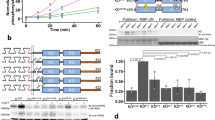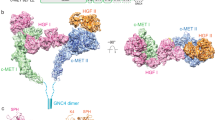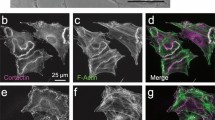Abstract
The receptors for mesenchymal growth factors contain tyrosine kinase coding sequences and exhibit ligand-activated tyrosine kinase activity. A variety of mutations of the epidermal growth factor1,2, insulin3,4 and platelet-derived growth factor (PDGF) (manuscript in preparation) receptors that have resulted in a loss of tyrosine kinase activity have produced a concomitant loss of growth factor-stimulated DNA synthesis. Comparison of amino acid sequences of tyrosine kinases shows that these regions in the PDGF receptors in mouse5 and human6 contain an insert of unknown function. We have deleted this region, and expressed the altered form of the receptor in fibroblasts which lack PDGF receptors. This had no effect on a number of responses to PDGF, but cells bearing the mutant receptor did not proliferate or synthesize DNA in response to PDGF. This demonstrates that the insert is essential in PDGF-induced mitogenesis, and that PDGF stimulation of the mutant receptor tyrosine kinase and phosphatidy-linositol turnover are not sufficient to elicit a mitogenic response to PDGF.
This is a preview of subscription content, access via your institution
Access options
Subscribe to this journal
Receive 51 print issues and online access
$199.00 per year
only $3.90 per issue
Buy this article
- Purchase on Springer Link
- Instant access to full article PDF
Prices may be subject to local taxes which are calculated during checkout
Similar content being viewed by others
References
Livneh, E. et al. J. biol. Chem. 261, 12490–12497 (1986).
Chen, W. S. et al. Nature 328, 820–823 (1987).
Chou, C-K. et al. J. biol. Chem. 262, 1842–1847 (1987).
Russell, D. S., Gherzi, R., Johnson, E. L., Chou, C.-K. & Rosen, O. M. J. biol. Chem. 262, 11833–11840 (1987).
Yarden, Y. et al. Nature 323, 226–232 (1986).
Escobedo, J. A. et al. Science 240, 1529–1531 (1988).
Escobedo, J. A., Keating, M. T., Ives, H. E. & Williams, L. T. J. biol. Chem. 263, 1482–1487 (1988).
Keating, M. T. & Williams, L. T. J. biol. Chem. 262, 7932–7937 (1987).
Wang, J. Y. J. Molec. cell. Biol. 5, 3640–3643 (1985).
Berridge, M. J. Biochem. J. 212, 849–858 (1983).
Ives, H. E. & Daniel, T. O. Proc. natn. Acad. Sci. U.S.A 84, 1950–1954 (1987).
Sanger, F., Nicklen, S. & Coulson, A. R. Proc. natn. Acad. Sci. U.S.A. 74, 5463–5467 (1977).
Ellis, L. et al. Proc. natn. Acad. Sci. U.S.A. 84, 5101–5105 (1987).
Author information
Authors and Affiliations
Rights and permissions
About this article
Cite this article
Escobedo, J., Williams, L. A PDGF receptor domain essential for mitogenesis but not for many other responses to PDGF. Nature 335, 85–87 (1988). https://doi.org/10.1038/335085a0
Received:
Accepted:
Published:
Issue Date:
DOI: https://doi.org/10.1038/335085a0
This article is cited by
-
Differential effects of lovastatin on mitogen induced calcium influx in human cultured vascular smooth muscle cells
British Journal of Pharmacology (1997)
-
Cytoplasmic and nuclear localization sites of phosphatidylinositol 3-kinase in human osteosarcoma sensitive and multidrug-resistant Saos-2 cells
Histochemistry and Cell Biology (1996)
-
Regulation of chemotaxis by the platelet-derived growth factor receptor-β
Nature (1994)
-
PDGF-mediated activation of phosphatidylinositol 3 kinase in human mesangial cells
Kidney International (1994)
-
Inhibitors of phosphatidylinositol signalling as antiproliferative agents
Cancer and Metastasis Reviews (1994)
Comments
By submitting a comment you agree to abide by our Terms and Community Guidelines. If you find something abusive or that does not comply with our terms or guidelines please flag it as inappropriate.



